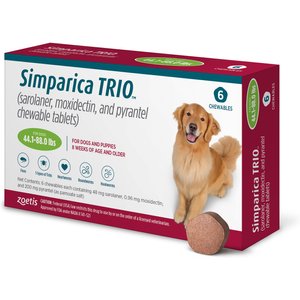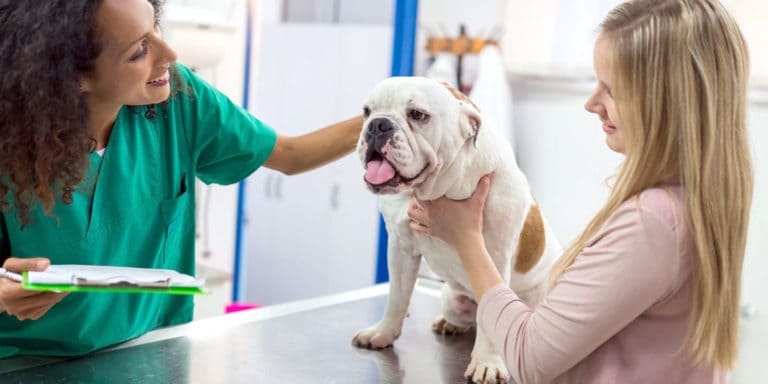Hookworms in dogs can lead to life-threatening health problems—including anemia and respiratory disease in puppies—if not properly treated. And if that’s not bad enough, hookworms are zoonotic, which means they can infect humans, too.
Want to know more about this common intestinal parasite? Read on to learn how to identify, treat, and prevent hookworms in dogs.
In This Guide:
Lifecycle of a Hookworm
Hookworms, also known as Ancylostoma spp., are small nematodes found in dogs’ and cats’ small intestines, says Heather Stockdale Walden, Ph.D., assistant professor of parasitology at the University of Florida College of Veterinary Medicine in Gainesville, Florida.
Their lifecycle begins as eggs release into the environment via the animal's feces, Dr. Walden says. “That’s where the larvae hatch, develop, and mature to a stage that is infective to the dog or cat."
Adult hookworms live in your pet's colon four to 24 months, according to the Companion Animal Parasite Council (CAPC). Attached to the animal’s small intestine mucosa, they digest tissue, suck blood, and inject anticoagulants to prevent clotting. Hookworms range in size from 10–20 millimeters long by 0.4–0.5 millimeter wide.
How Do Dogs Get Hookworms?
So, how exactly do dogs get hookworms? They enter the animal in various ways, according to Dr. Walden.
“Usually with dogs, the larvae will penetrate the skin and migrate through the animal, making their way to the small intestine to mature,” she says.
Sometimes, dogs can become infected by ingesting contaminated feces or soil.
“Dogs can also become infected by ingesting a host, like a rodent, that has dormant larvae,” Dr. Walden adds.
Hookworm larvae can enclose themselves in cysts in muscle tissue and remain dormant until it’s time to repopulate the dog’s small intestine or her mammary glands upon onset of lactation, Dr. Walden says.
That's why newborn puppies are particularly at risk of infection.
“Transmission of larvae to pups via mother’s milk is another common way of infection,” she says. “Once in the intestine, they mature to adults and start the cycle again.”
Hookworms Symptoms in Dogs
Dogs of all ages can be affected by hookworms, says Dr. Walden.
“Puppies and older dogs, however, are most susceptible to clinical signs,” she says.
The clinical signs of hookworms in dogs include:
- Bloody or black, tarry diarrhea that may contain mucus
- Poor appetite
- Poor growth/hair coat
- Anemia (with heavy infections)
- Respiratory disease and pneumonia (with heavy infections)
Senior dogs with hookworms may have ongoing anemia, diarrhea, and weight loss, notes the CAPC.
Adult dogs often show no clinical signs of hookworms unless they're stressed or malnourished, Dr. Walden says. “The owner may not know the dog is infected until an annual fecal exam is done at their veterinarian’s office."
Diagnosing Hookworms
To diagnose a hookworm infection, your veterinarian will inspect and test your dog’s feces, Dr. Walden says.
"Hookworms are diagnosed by fecal flotation with centrifugation and seeing the eggs," she says. "An adequate amount of feces should be used. Pet parents can help out by bringing in a fresh sample for their veterinarian when they come in for their examination."
Puppies should be tested for hookworms more frequently than adult dogs, Dr. Walden says.
"CAPC recommends testing for intestinal parasites, including hookworms, at least four times in the first year of life and at least two times per year in adults depending on patient health and lifestyle factors," she says.
Treatment of Hookworms in Dogs
If your dog tests positive for a hookworm infection, his doctor should suggest a vet-recommended deworming (or anthelmintic) medication.
"None of these, however, will kill the dormant larvae encysted in the muscle tissue," notes Dr. Walden.
Hookworm treatment for dogs with severe infections includes anthelmintic medication combined with supportive therapy, like fluids with electrolytes, iron supplements, a high-protein diet, and blood transfusions, says the CAPC.
How To Prevent Hookworms in Dogs
To prevent hookworms in dogs, Dr. Walden recommends year-round broad-spectrum parasite control that works against hookworms and other parasites like heartworms. Talk to your veterinarian about the one that will work best for your dog.
"Owners can also reduce their dog's exposure to hookworms by timely removal of feces from their environment," she says.
If you have puppies in the house, treat them for hookworms at 2, 4, 6, and 8 weeks of age with a vet-recommended deworming medication, suggests the CAPC. Nursing mothers should be treated along with their puppies.
The best treatment of hookworms in dogs is prevention, so be sure to have a conversation with your veterinarian about your pup's options. They can help you keep your dog protected against all parasites, including intestinal parasites like hookworms, so they can live a long and healthy life.
Expert input provided by Heather Stockdale Walden, Ph.D., assistant professor of parasitology at the University of Florida College of Veterinary Medicine in Gainesville, Florida.
This content was medically reviewed by a veterinarian.
Learn more about parasites in dogs and puppies
Share:












